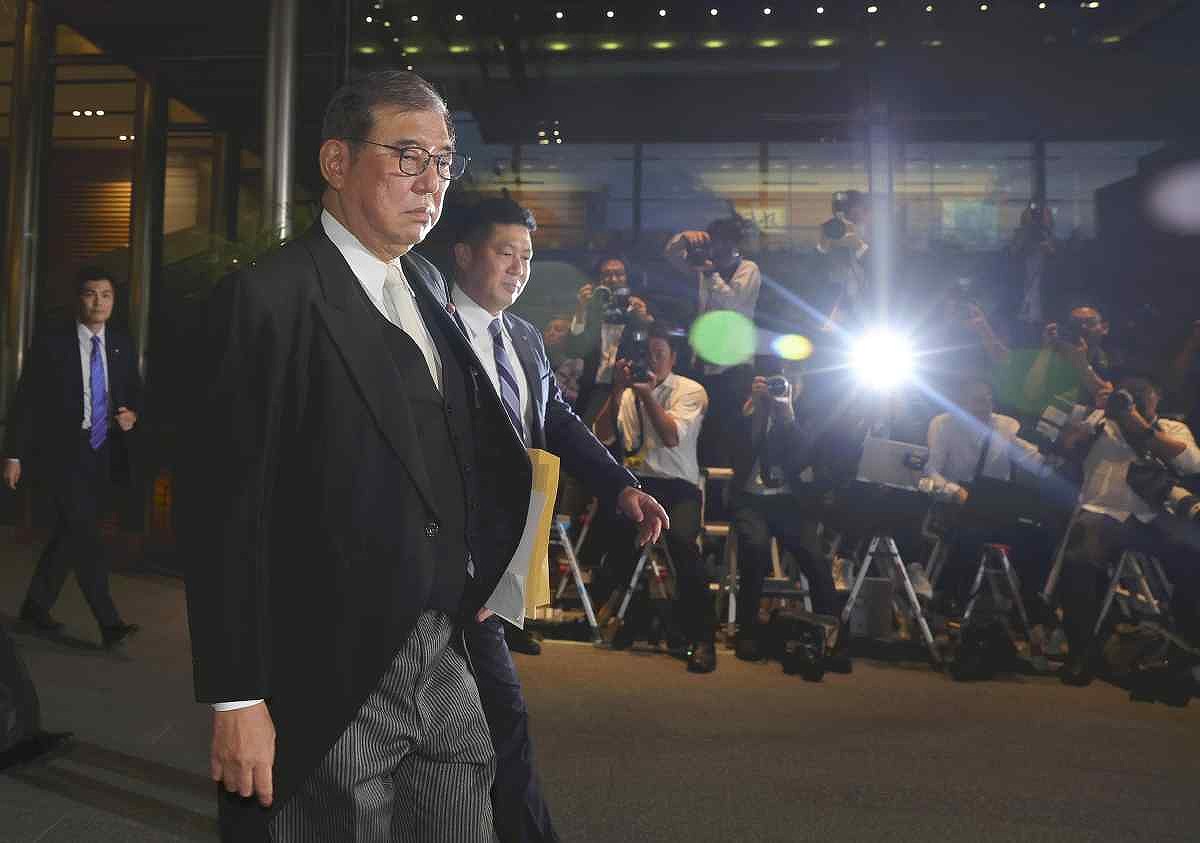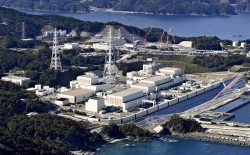Practicalities of Office Clash with Ishiba’s Ideals; Japan’s New Prime Minister Faces Foreign, Security Policy Dilemmas

Prime Minister Shigeru Ishiba leaves the Prime Minister’s Office for his Imperial investiture ceremony on Tuesday.
20:00 JST, October 2, 2024
Prime Minister Shigeru Ishiba, who took office Tuesday, is already getting a reality check regarding his foreign and security policy beliefs as well as his ideas about the dissolution of the House of Representatives.
From the perspective of the Japan-U.S. alliance and in terms of running the government, Ishiba seems to have realized that there are many things he will have to postpone or give up.
Ishiba is a person who is concerned more with logic than practicality. However, some observers said that he had no choice but to abandon such a stance.
On Tuesday night, while showing his desire to revise the Japan-U.S. Status of Forces Agreement (SOFA), which he has advocated for many years, Ishiba indicated that he recognized that it would be difficult to do so quickly.
“I don’t think the situation will change overnight. But I don’t think we should give up at all,” he said at a press conference at the Prime Minister’s Office.
The prime minister’s beliefs on foreign and security policies have been causing a stir at home and abroad.
Ishiba has stated that the Japan-U.S. SOFA should be revised and that a training base for the Self-Defense Forces should be created in the United States.
However, some U.S. government officials said it was questionable whether bases only for training, which do not play a direct role in protecting the United States, would be necessary.
Ishiba also proposed the creation of an “Asian version of the North Atlantic Treaty Organization.” However, the creation of such an entity would require the full use of the right of collective self-defense, which is incompatible with Article 9 of Japan’s Constitution.
An aide to Ishiba suggested that the prime minister is planning to look at the issue from a medium- to long-term perspective, saying, “He only toughened his stance for the presidential election to distinguish himself from his rivals.”
One Cabinet member said, “If he goes ahead with [his beliefs], I’ll stop him by any means necessary.”
At the beginning of his Tuesday press conference, Ishiba did not mention the Asian version of NATO or the SOFA revision. When questioned by reporters, Ishiba said he had not given instructions on these issues to the foreign minister or the defense minister.
The government plans to send Akihisa Nagashima, the prime minister’s special adviser in charge of national security, to the United States soon to explain Ishiba’s intentions.
Rejecting opposition’s demands
Regarding the dissolution of the House of Representatives on Oct. 9, Ishiba had to retract statements he made during the Liberal Democratic Party’s presidential race.
During the election campaign, Ishiba said that Budget Committee meetings should be held to allow for thorough discussion before the dissolution of the lower house, saying, “It is the responsibility of the new prime minister to provide the public with the information they need to make a decision.”
However, he rejected opposition parties’ demands that such meetings be held, so that he could dissolve the lower house in the shortest time frame of any newly elected prime minister since the end of World War II.
In an interview with The Yomiuri Shimbun before the LDP presidential election, Ishiba also indicated that he would speak to each of the lawmakers from the former Abe faction and other factions who were punished for violating the Political Funds Control Law to determine whether or not to endorse them in the upcoming lower house election.
However, with only two weeks until the announcement of the election, it is not realistic to provide them with individual opportunities to offer explanations given there are 25 lower house members who have been punished, an observer said.
Major dilemma
Ishiba plans to have a close aide, Ryosei Akazawa, the minister in charge of economic revitalization, handle designing the process for creating a disaster prevention ministry, which he has been striving to realize.
Akazawa plans to expand the Cabinet Office’s disaster prevention division and create a “disaster prevention agency” by the end of fiscal 2026, with a cabinet minister in charge, he told reporters at the Diet Building on Tuesday.
Akazawa also said he wanted to “take time to discuss” whether to further strengthen the system and make the agency a ministry.
However, some government officials said that the disaster prevention issue should be addressed by merely increasing the staff and budget of the relevant office.
Consensus-building within the government will likely be difficult as Chief Cabinet Secretary Yoshimasa Hayashi also showed a cautious stance about the creation of a disaster agency during the presidential election campaign.
“We should first discuss policy contents, such as accumulating knowledge,” Hayashi said.
The prime minister has stuck to his views, despite criticism about his “oppositional stance within the party,” which has helped him remain popular in rural areas.
“If he suppresses his views and character by taking pragmatic policies, he may be criticized for ‘changing his beliefs.’ This is a major dilemma for the prime minister,” said a Diet member close to Ishiba.
Related Tags
Top Articles in Politics
-

Japan PM Takaichi’s Cabinet Resigns en Masse
-

Sanae Takaichi Elected 105th Prime Minister of Japan; Keeps All Cabinet Appointees from Previous Term
-

Japan’s Govt to Submit Road Map for Growth Strategy in March, PM Takaichi to Announce in Upcoming Policy Speech
-

LDP Wins Historic Landslide Victory
-

LDP Wins Landslide Victory, Secures Single-party Majority; Ruling Coalition with JIP Poised to Secure Over 300 seats (UPDATE 1)
JN ACCESS RANKING
-

Japan PM Takaichi’s Cabinet Resigns en Masse
-

Japan Institute to Use Domestic Commercial Optical Lattice Clock to Set Japan Standard Time
-

Israeli Ambassador to Japan Speaks about Japan’s Role in the Reconstruction of Gaza
-

Man Infected with Measles Reportedly Dined at Restaurant in Tokyo Station
-

Man Infected with Measles May Have Come in Contact with Many People in Tokyo, Went to Store, Restaurant Around When Symptoms Emerged


















